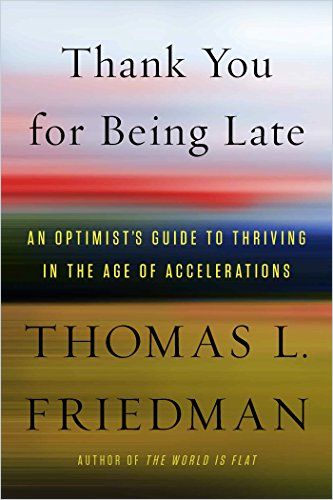Bestseller and New York Times columnist Thomas L. Friedman describes the coming future and how America might adjust to it.

Cope with Change or Else
Three-time Pulitzer Prize–winning New York Times columnist Thomas L. Friedman offers an in-depth consideration of how technology, climate change and acceleration change every aspect of life everywhere.
This book did extraordinarily well. It was a number one New York Times and Los Angeles Times bestseller, listed among The Wall Street Journal’s 10 Books to Read Now, an OWL Business Book Award shortlist finalist, a Financial Times long list finalist and a McKinsey Business Book of the Year. In it, Friedman provides detailed tours of the history of a range of technologies, geopolitical forces and climate shifts. He ends each history by explaining how that technology, force or climate trend will further accelerate and then speculating as to the consequences of that acceleration. And he winningly and charmingly urges Americans to vest in their communities, to rebuild a sense of belonging to one nation by encompassing one neighbor at a time.
Friedman does not enthrall everyone, however. Rolling Stone castigated his repetitiveness by describing the author’s career as, “Build a sentence into a column; build a column into many columns; build many columns into a book; build one book into many books. Then start over!”
Friedman also relates perhaps too many anecdotes showcasing how his ignorance turned to knowledge in a flash of revelation. Some feature the supposed humility that can be his stock-in-trade. You know he already knew.
The ultimate spring of human variability…lies in our capacity to invent new ideas, practices and institutions.Thomas Friedman
Even so, his anecdotes genuinely connect Friedman with his readers and help them understand how the world is changing under their feet. He’s made a career of articulate alarmism; here he sensibly, and with great clarity, urges individuals, business and nations – especially America – to adapt to changing times or be swept aside.
Coping Anew
Friedman’s thesis is that society must learn to cope with the trauma of change and progress. He asserts in the strongest terms that now is the time for major industrial nations to stop for a moment, consider and reinvent their politics. Easy to say from a pundit’s pulpit, not quite so easy to enact.
The three largest forces on the planet – technology, globalization and climate change – are all accelerating at once.Thomas Friedman
Friedman argues convincingly that today’s future launched in 2007, when the iPhone debuted, Hadoop launched new levels of data storage, Change.org appeared and developers began working on GitHub, an open-source software collaboration platform. Google purchased YouTube in late 2006 and released Android in 2007. Between 2007 and 2014, according to Friedman’s chronicle, AT&T poured money into software-enabled networks that generated a more than 100,000% increase in mobile usage on its US networks.
In 2007, Amazon offered the Kindle e-reader just as Qualcomm’s 3G technology allowed readers to download an infinity of books. Airbnb emerged. Intel introduced non-silicon materials in its microchips, thus assuring exponential growth in processing power. As this avalanche of innovation continues to breed scientific, technological and social innovation, Friedman believes these changes appeared too quickly for people or their “social structures” to adjust to them.
Software production is accelerating even faster now, not only because tools for writing software are improving at an exponential rate.Thomas Friedman
To help readers understand technological acceleration, Friedman offers a worthwhile example: the Intel chip. Compared with Intel’s 1971 first-generation chip, the Intel Core processor – six generations later – provides 3,500 times the performance, runs with 90,000 times greater energy efficiency and costs 60,000 times less.
Keeping Your Job
Friedman doesn’t think a robot will take your job. He maintains that technology will handle most routine tasks, just as voicemail has replaced answering a phone call.
The world cannot get this connected in so many new realms at such profound new depths without being reshaped.Thomas Friedman
Once upon a time, Friedman relates, you could come to work, do an OK job, obey your boss, stay average and keep your job forever. Today, he insists, no employer has the patience for average results since high-wage, middle-skill jobs no longer exist. You must keep improving and learning, Friedman reports – as does pretty much every other author who addresses change – just to stay in place.
The Future United States
Today, approximately 50 million children attend American K-12 public schools. In 2015, for the first time in history, the majority were minorities: African-American, Hispanic and Asian. Writing in 2016, Friedman cited contemporaneous research saying that by 2020, 65% of American jobs would require education beyond high school. He cited a 2013 study finding that computers are likely to do 47% of all US jobs by 2038. Within 25 years, Friedman reports – as do many other books on change – white people will be an American minority, so government, education and business must embrace a new plurality. Again, he doesn’t exactly detail how to pull this off.
Lately, many Americans have lost sight of both their country’s achievements and its vital role in stabilizing the global commons.Thomas Friedman
According to Friedman’s metaphor, the streets of New York City were never more dangerous than when cars first appeared in the early 1900s, competing with horses and the rigs they pulled. And, like New Yorkers giving up their carriages, he maintains that people and institutions invent their response to change as they go along. Friedman’s often-repeated theme is that today’s society faces a profound, complex and necessary transition.
Endless Erudition
Friedman has a long-established reputation as one of America’s foremost commentators. If not exactly an intellectual, he’s still smarter than most commentators. Friedman’s interests are wide-ranging, his curiosity unquenchable and his information is reliable and well-reported. His main flaw is his heartfelt, passionate love of his own voice. In this massive volume, he never uses one word when 10 might suffice or one example when he has five at hand. Your choice is whether to plow through from start to finish and extract the astonishing jewels of insight and little-known facts that Friedman unearths or to hunt and peck judiciously, choosing topics of interest and focusing on those. Or, perhaps this is a work best read a couple of chapters at a time, left alone and then returned to again – and often. Whichever method you choose, Friedman offers rich rewards.
Civic habits and skills learned in local associations and neighborhood councils equip citizens to exercise self-government at the state and national level.Thomas Friedman
Friedman’s many books include From Beirut to Jerusalem; The World Is Flat; The Lexus and the Olive Tree; Hot, Flat and Crowded; Longitudes and Attitudes; and That Used to Be Us.












